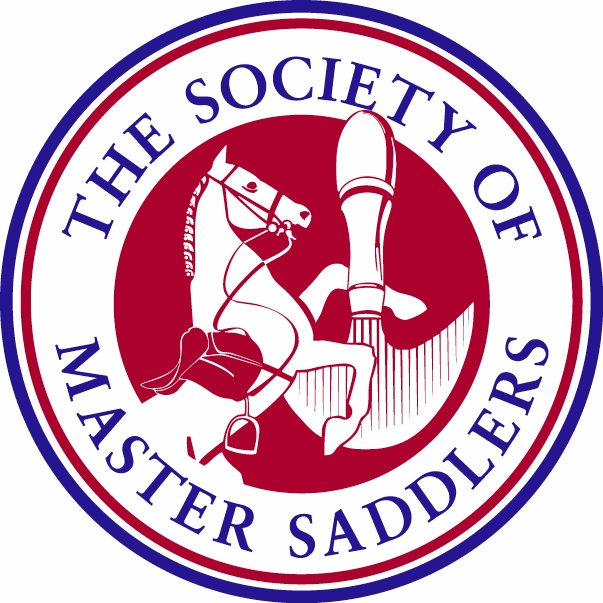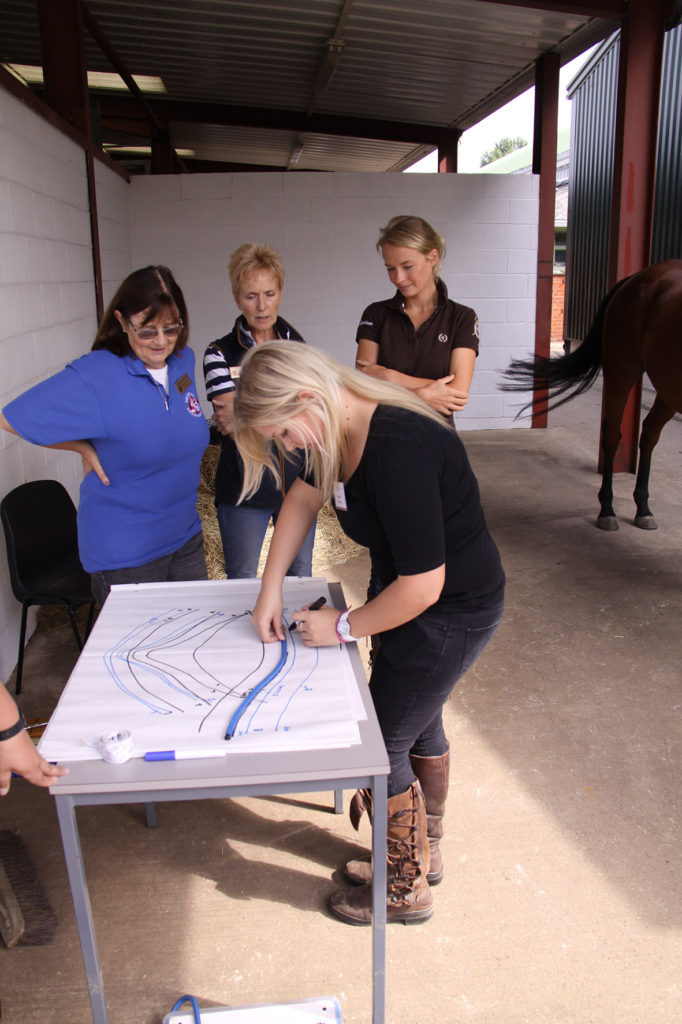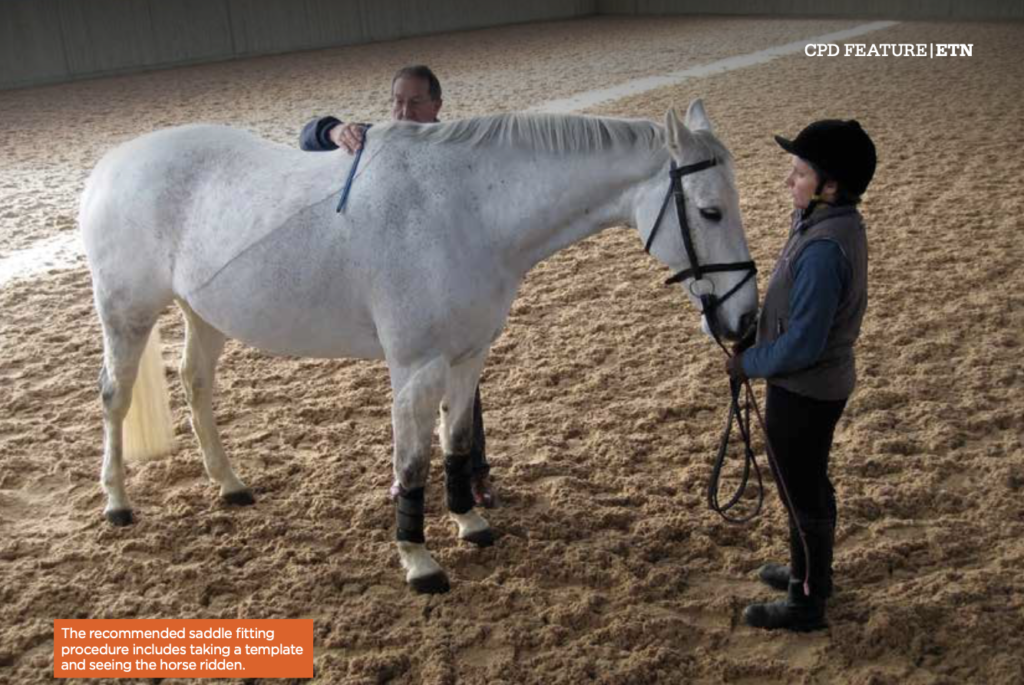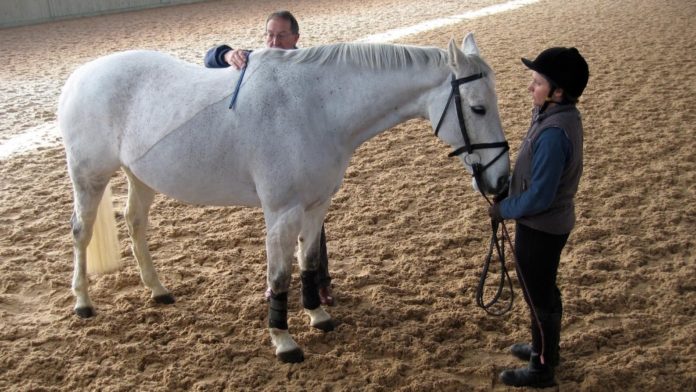Cracking the code

Exemplary standards are expected from professional, qualified saddle fitters, as Beatrice Blakeman explains.
The Society of Master Saddlers (SMS) has long been associated with skilled crafts people and tradition, and over the last two decades the field of saddle fitting has grown significantly.
The SMS held its first saddle fitting assessments in 1995 before partnering with City & Guilds (C&G) in 2007. The attainment of the C&G Certificate in SaddleFitting is seen as the gold standard and recognition of a high standard of expertise. This qualification is independently verified and accredited and is recognised worldwide.
The SMS executive committee oversees and pushes for continual development of educational pathways for both saddle fitting and saddlery training, making sure that standards remain high and that entrants from all routes are supported.
This spirit of development is continued after qualification as members undertake Continued Professional Development (CPD). SMS Qualified and Registered Saddle Fitters (Reg. QSF) are required to maintain an average of 15 points over two years. All society members are expected to uphold high professional standards with regard to service, and welfare of horse and rider.
Being an SMS Reg. QSF or SMS member requires the individual or company to run their business in accordance with the society’s Code of Conduct which states: “The prime responsibility of the SMS and its members is to the health and welfare of the horse and the comfort and safety of the rider.”
SMS members are expected to:
- Maintain professional standards at all times.
- Adhere to the highest standards of health and safety, including bio security.
- Correct or replace any defective goods.
- Carry out repairs to items in a satisfactory manner using materials fit for purpose.
- Encourage their apprentices and trainees to reach their full potential.
- Support UK based manufacturers.
- Hold the appropriate professional indemnity insurance.
- Advertise within the current legislation.
- Maintain client/owner confidentiality unless there is a lawful obligation to do otherwise.
- Not make false claims about their qualifications.
The Code of Conduct also goes into further details with regards to saddle fitting. Members who offer this service are expected to:

- Keep full records, including taking templates at each visit.
- Inform customers of the costs of their service prior to attendance.
- Comply with legislation and consumer protection law. For example, the 14 day right to cancel a contract is a necessity for distance (off- premises) selling.
- Carry out the recommended saddle fitting procedure which includes seeing the horse ridden.
- Offer an after-sales service and recommend a re-visit or check within three months of a new saddle being fitted.
SECOND OPINIONS
Guidance is also offered on giving second opinions on saddle fitting. It is easy to fall into the trap of giving an informal assessment from a quick glance, pushed by the horse owner who is desperately trying to find a resolution.
Here, the SMS recommends a cautious approach;
a wrong word or misinterpretation may unknowingly cause damage to another member’s reputation. These cases
are often sensitive and should be handled with care as follows:
- If the saddle has been fitted recently by another member (within six months) and you are advised that there is a problem, you should make no criticism of theoriginal fitting. You should then firstly refer the customer to return to the original fitter to give them the opportunity to resolve any problems. Bear in mind that in some instances, the original fitter may not even be aware there is a problem.
- If the client is not prepared to work with the original fitter, then it is appropriate for you to contact the original fitter to discuss (with the owner’s consent) the case and what has transpired.
- Remember you can only give a second opinion based on what you see with regards to a saddle on the day. You should not comment on how it may or may not have fitted months previously.
- Be careful not to undermine fellow SMS qualified saddle fitters. Knowingly doing so to members of the public can reduce confidence in the profession as a whole.

IN CASE OF COMPLAINT
The Code of Conduct is there for SMS members’ protection. To crack the code – use it to your advantage, remember that’s what sets you, an SMS member, apart from other saddle suppliers who do not operate under a professional trade body.
Following the code usually means that formal complaints are avoided, communication remains open and, most importantly of all, the welfare of the horse remains paramount.
In the case of a complaint being made, the SMS office will initially try to liaise with the member and the complainant to re-open the communication channel. In most cases, this is sufficient for both parties to find a satisfactory outcome.
If an individual wants to make a formal complaint, they must do so in writing, detailing all appropriate information. This is then passed to the SMS liaison officer, who will determine next steps and if a formal second opinion is required to resolve matters.
As a fellow business owner and SMS Reg. QSF, these are my own personal recommendations which sit alongside the SMS Code of Conduct.
- Have your own policies and procedures in place to deal with complaints and problems. You and your employees can then work to this guideline to move asituation forward.
- Respond to clients ideally within 24 to 48 hours of notification of a problem.
- Keep communication channels open. If you haven’t heard back, don’t think ‘no news is good news’, follow it up and be seen to making an effort to find a satisfactory outcome.
- Look to re-visit the client and their horse within 7–14 days, wherever possible.
- Resolve any problems within 7–14 days if achievable; it will mean less stress for you and your client.
- Put pride and principle aside – look for resolution – your reputation is built not only on the good times but how you deal with the bad or more challenging times.
- Don’t take a complaint personally. Initial communication can be tense. Generally, people are nervous about complaining, they are worried about their horse, and they almost certainly lack the breadth of knowledge you have about saddle fit. Responding calmly and collecting all relevant information will soothe your relationship with the client, and show them that you are just as keen to resolve the issue. Very often only small adjustments are necessary.
- Speak to your colleagues. We are out on our own most of the time, and it can really help to speak to fellow QSFs, if not just to confirm that you are not alone in your concerns and worries. With your client’s consent, look to more experienced members to advise you on challenging cases.
Details of the SMS business guidelines and Code of Conduct can be found at www.mastersaddlers.co.uk in the members’ area.

Or contact the office for details.
About the author:
Beatrice Blakeman is the owner of Crewe Saddlery and SMS vice president.











